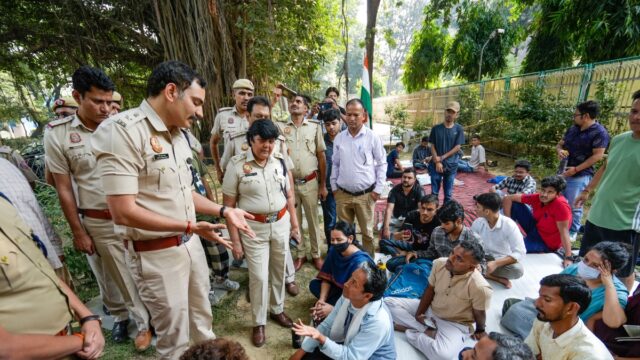Climate activist Sonam Wangchuk has been leading an indefinite hunger strike in Delhi since October 6th, demanding the inclusion of Ladakh in the Sixth Schedule of the Constitution. This demand has sparked controversy and protests, leading to the detention of several of his supporters by the Delhi Police. This action has ignited further concerns about the limits of freedom of assembly in India, with Wangchuk himself questioning the permanent enforcement of Section 163 of the BNSS in Delhi.
The Demand for Sixth Schedule Inclusion
The Leh Apex Body and the Kargil Democratic Alliance have been advocating for Ladakh’s inclusion in the Sixth Schedule for the past four years. Their demand stems from a desire to protect the unique cultural identity and autonomy of the region. The Sixth Schedule provides special administrative provisions for tribal areas in the Northeast, granting autonomous councils significant power in governance.
Benefits of Sixth Schedule Inclusion:
- Preservation of Culture: The Sixth Schedule would offer safeguards for Ladakh’s distinct cultural identity, including language, traditions, and indigenous rights.
- Economic Autonomy: The Sixth Schedule empowers local councils to manage natural resources, potentially leading to greater economic development and benefits for the local population.
- Political Representation: The framework allows for a more direct form of political representation for Ladakhis, ensuring their concerns are addressed effectively.
- Resource Management: The Schedule allows for more efficient and localized resource management, ensuring sustainable development and environmental protection.
The Activist’s Hunger Strike and Detention
Sonam Wangchuk, a renowned climate activist, has taken a bold stand by launching a hunger strike in Delhi to garner attention for Ladakh’s inclusion in the Sixth Schedule. His peaceful protest has resulted in a tense stand-off with authorities, leading to the detention of several of his supporters.
The Detainees:
- Supporters of Wangchuk’s cause were detained from outside the Ladakh Bhawan in Delhi, where Wangchuk is staging his hunger strike.
- Section 163 of the BNSS: This provision, which prohibits unauthorized gatherings, was cited as the justification for the detentions.
- Freedom of Assembly Concerns: Wangchuk’s criticism of the permanent enforcement of Section 163 highlights the growing concerns about the shrinking space for peaceful dissent in India.
- Protesters’ Demands: The detainees were advocating for Ladakh’s inclusion in the Sixth Schedule and demanding a meeting with top officials, including Prime Minister Narendra Modi.
Legal Implications and Concerns
The Delhi Police’s actions in detaining protesters, including Wangchuk’s supporters, have raised serious concerns about the government’s approach to dissent. The permanent enforcement of Section 163 in New Delhi has been met with criticism, questioning whether the government is curtailing fundamental rights.
Criticisms of Section 163:
- Restriction on Freedom of Assembly: The application of Section 163 in Delhi raises questions about whether the government is employing it as a tool to stifle peaceful protest.
- Unjust and Discriminatory: Some argue that the blanket application of this section, without a clear threat to law and order, can be seen as unjust and discriminatory.
- Transparency and Due Process: Concerns remain regarding the clarity and fairness of the application of this section, particularly when peaceful protests are being targeted.
Sixth Schedule: A Potential Solution or Further Divisions?
The demand for Ladakh’s inclusion in the Sixth Schedule presents both opportunities and challenges. While supporters envision it as a solution for protecting the region’s culture and autonomy, critics argue it could further divide the country.
Arguments for Inclusion:
- Preserves Cultural Identity: Inclusion would recognize the unique culture and heritage of Ladakh and protect its identity within India.
- Promotes Autonomy: The framework empowers local populations to manage their resources and governance, promoting self-reliance and development.
- Empowers Indigenous Rights: It offers a mechanism for the protection of indigenous rights, including language and cultural practices.
Arguments Against Inclusion:
- Divisions and Segregation: Inclusion could further fragment the country by granting special privileges to specific regions.
- Unnecessary Complexity: The already complex structure of India’s political landscape could be made even more intricate.
- Funding and Resource Allocation: Inclusion might create tensions over resource allocation, favoring specific regions.
Take Away Points:
- The demand for Ladakh’s inclusion in the Sixth Schedule has ignited a debate over the best approach to protecting cultural identity and promoting regional autonomy in India.
- The peaceful protests by Wangchuk and his supporters have highlighted the importance of respecting the right to dissent and peaceful assembly.
- The use of Section 163 of the BNSS raises serious concerns about the government’s approach to peaceful protests and the protection of fundamental rights.
- The discussion around Ladakh’s inclusion in the Sixth Schedule requires careful consideration of the potential benefits and drawbacks, ensuring a balanced and equitable approach to address the concerns of all stakeholders.
Disclaimer : इस न्यूज़ पोर्टल को बेहतर बनाने में सहायता करें और किसी खबर या अंश मे कोई गलती हो या सूचना / तथ्य में कोई कमी हो अथवा कोई कॉपीराइट आपत्ति हो तो वह jansandeshonline@gmail.com पर सूचित करें। साथ ही साथ पूरी जानकारी तथ्य के साथ दें। जिससे आलेख को सही किया जा सके या हटाया जा सके ।














